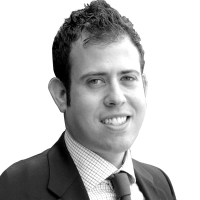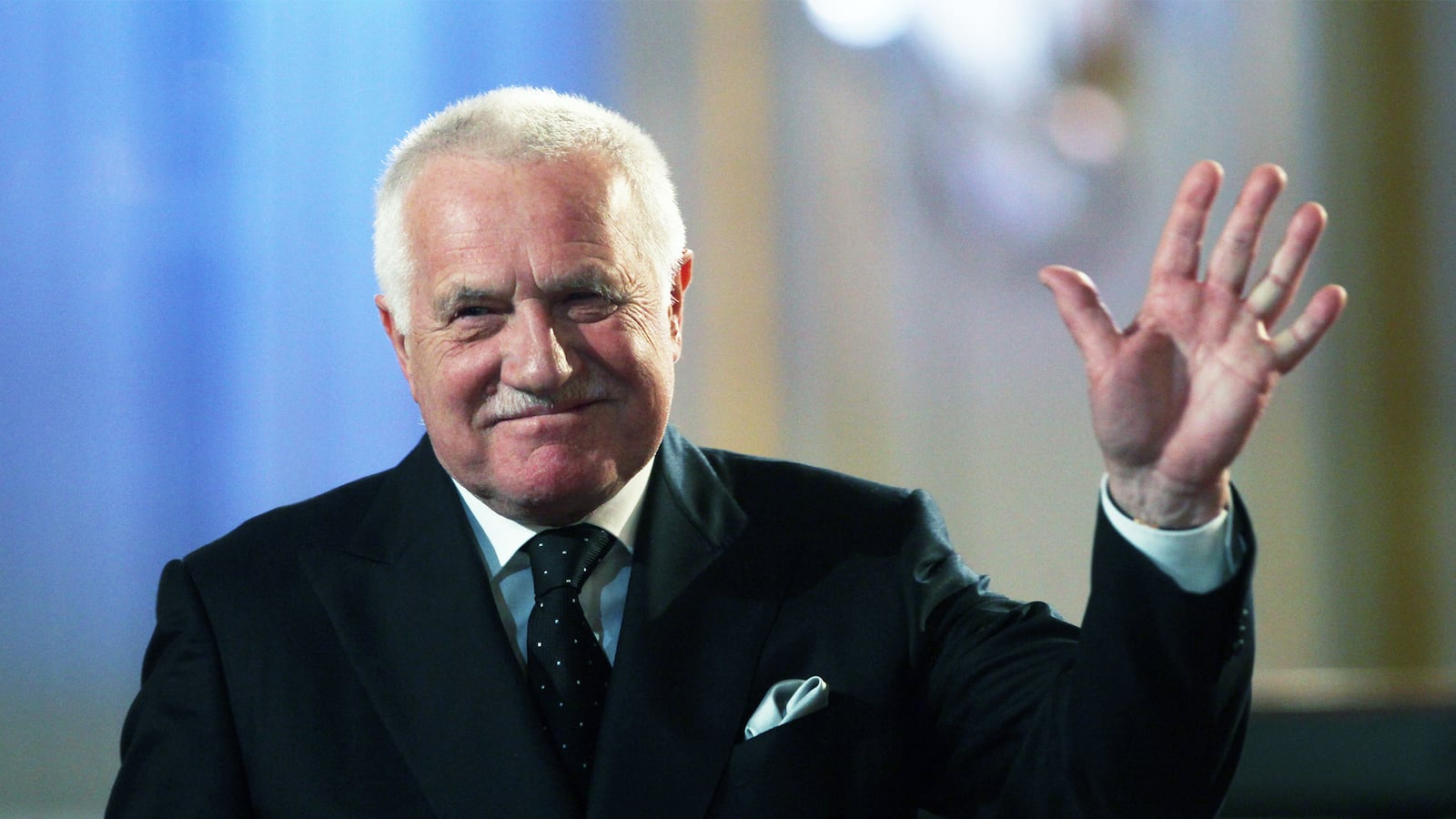Wherever he travels, Václav Klaus can be assured a welcome reception from likeminded free marketers. The former president of the Czech Republic cites Margaret Thatcher as his political heroine and became famous throughout the post-communist space for spearheading the rapid privatization of state-owned enterprises as prime minister in the 1990s. A regular on the international libertarian speaking circuit, Klaus’s critiques of the European Union as a tyrannical force akin to the old Soviet empire, and his derision of climate change activists (he once likened “climate alarmism” to communism) have earned him a global audience of admirers far more numerous than what most leaders of small, Central European countries attract after leaving office.
But now Klaus’s big mouth has landed him in hot water with the world’s flagship libertarian establishment, a place that he frequently used to visit but where he is today reportedly no longer welcome: Washington, D.C.’s Cato Institute.
On September 1, according to two sources at the think thank, Cato quietly “ended” its “official relationship” with Klaus, whom it had named a Distinguished Senior Fellow last March. The alleged reason for the split is the former Czech leader’s slavish defense of Russian President Vladimir Putin’s aggression against Ukraine, as well as his hostility to homosexuality and cozying up to figures on the European far right.
“The events this year with Ukraine led to his ties with Cato being severed,” a source at the think tank told The Daily Beast. This source also cited Klaus’s “attitude toward personal rights, gay rights, for libertarians an essential part of the ideology” as well as his associating “very openly with far right parties and organizations.” The claim was confirmed by another Cato source. Neither individual would go on the record due to the sensitivity of discussing personnel matters. Khristine Brookes, Cato’s Vice President for Communications, declined to comment on the record.
Through a spokesperson, Klaus does not deny that he and Cato parted ways. But he blames the rupture solely on Andrei Illarionov, a Senior Fellow at the think tank and a former Putin advisor who left the president’s employ in 2005 and is now one of the Russian president’s harshest critics. “There has never been the slightest dispute between President Klaus and the Cato Institute in the past, on the contrary, he has been repeatedly invited to give keynote speeches at various Cato events,” Klaus spokeswoman Karolina Králová told the Beast. “There is just a dispute of former President Putin´s long term collaborator Mr. Illarionov, who was fired from Kremlin, with President Klaus´s views on the situation in Ukraine. Nothing else.”
Illarionov would not speak to the Beast on the record.
A severing of ties would no doubt come as a crushing blow to Klaus, who prides himself on being a contrarian and enjoys touting his affiliation with prominent institutions outside his tiny home country. And it wasn’t so long ago that Cato was praising the former Czech president as a champion of libertarian ideals. “Václav Klaus proved that a steadfast belief in the free market coupled with strong leadership skills could move a nation to throw off the shackles of communism,” Cato President and CEO John Allison declared in a press release announcing the institute’s bestowal of a Distinguished Senior Fellowship (an honorary unpaid title) upon Klaus last year. “We are looking forward to working closely with this champion of liberty.” The release noted that Klaus “has been a regular guest” at Cato, and that the institute frequently published his articles and lectures over the years.
But Klaus’ defense of Russian behavior in Ukraine apparently became too much for even the non-interventionists at Cato, who, while generally opposing an activist American foreign policy, saw Klaus’s positions as veering into outright advocacy of Russian aggression. As early as February 21, before the former pro-Russian Ukrainian President Viktor Yanukovych fled the country, Klaus took to the website of his foundation to question Ukraine’s very right to exist++ as a sovereign country, using the preferred Soviet nomenclature to call “The Ukraine” an “artificial entity.”
Two months later, Klaus co-authored an article with his former chief of staff in which he argued that Russia’s annexation of Crimea was a “forced move,” as if the Kremlin had no other choice but to tear asunder Europe’s post-war security order and gobble up part of its neighbor’s territory. The Yanukovych regime, the men wrote, took “no repressive actions” against Ukrainian citizens peacefully participating in the EuroMaidan protest, a patently false assertion in light of the some 100 people murdered in broad daylight by the former president’s security forces.
Over the course of the year, Klaus would repeatedly, through word and deed, demonstrate his sympathies with Putin. On May 9, which Moscow commemorates as World War II “Victory Day,” Klaus paid a highly visible visit to the Russian Embassy. Most of the Czech political elite boycotted the event in protest of Russia’s behavior, and so Klaus—this self-proclaimed Thatcherite disciple of the free market—was joined by a bevy of aging Czech communists and old KGB informants. In July, a pro-Russian outfit called the American Institute in Ukraine held a conference under the auspices of Klaus’ Prague-based institute. Speakers included a former defense witness for Serbian genocidaire Slobodan Milosevic and Klaus himself, who railed against “unilateral pro-Western propaganda” and offered to help divide Ukraine based upon his own experience in the peaceful division of Czechoslovakia.
Klaus espouses inflammatory views on a variety of subjects, some of which Cato happily embraced. His skeptical take on global warming, according to one source at the think tank, “from our point of view is absolutely reasonable.” As for his harsh—some might even say paranoid—opposition to European integration, “most of us would support him.” Ultimately, it was Klaus’s overt support for Moscow’s foreign policy that proved irreconcilable with the Cato mission.
Klaus was scheduled to speak at a conference earlier this year commemorating the 25th anniversary of the collapse of communism, yet was ultimately disinvited, according to one Cato source, “to avoid awkwardness.” The former president alluded to this incident in an interview with the London Spectator, portraying his exile from Cato as yet another episode in his long victimization at the hands of the politically correct powers-that-be. “The US/EU propaganda against Russia is really ridiculous and I can’t accept it,” he said. “I feel repressed by not being allowed to express my views. I have permanent troubles with this. Suddenly I have discovered, for the first time in 20 years, having been invited to be a keynote speaker at a conference, that the organizers find out I have reservations about the EU, about same-sex marriages, about the Ukraine crisis, and they say, ‘We are very sorry, we have already found a different keynote speaker, thank you very much.’ This is something I had experienced in the communist era but not in so-called free Europe.”
No one, of course, was “repressing” Klaus or preventing him from “expressing his views,” something he does with abandon. His likening a dis-invitation from a think tank conference to the plight of a Soviet-era dissident (not that Klaus would know anything about what it was like to be one, that being his predecessor and rival Vaclav Havel’s metier) was whiny victimization. But Klaus has a habit of making absurd, self-aggrandizing comparisons to the communist past; his spokeswoman telling me: “President Klaus has long experience of being fired from his jobs in the communist era because of his views, he is just surprised that the same procedure was used in the current, politically correct America.”
Klaus, fittingly, made these comments about the brutal tactics of American libertarians on the sidelines of a conference in Belgrade sponsored by the Russian Foreign Ministry and hosted by a foundation committed “to preserve the Russian national legacy both in Russia and abroad.” One of the main speakers was Vladimir Yakunin, head of Russian Railways, longtime friend of Vladimir Putin, and one of the first Russian officials to be targeted with international sanctions following the annexation of the Crimean peninsula in March.
Klaus’ banishment from Cato appears to be having something of a ripple effect throughout the libertarian world. Also in September, Klaus spoke at a Hong Kong gathering of the Mont Pelerin Society, a closed, high-level coterie of free market economists. Asked about the rise of nationalism in Europe, according to one person at the confab, Klaus “got into the Ukraine business on his own,” concluding that the “Ukraine problem was brought about by the United States and European Union and that Putin was innocent. For many people in the room it came across as a novelty.” After his tirade, Klaus, according to this source, “did look quite lonely,” particularly in contrast to past society meetings, when dozens of people typically lined up to shake his hand. This time, however, Klaus was “scanning the room during coffee breaks for someone to talk to.” Although Klaus was widely tipped to be elected president of the society this year, he was rejected in favor of Spanish economist Pedro Schwartz.
Cato’s decision to separate itself from Klaus is laudatory, but curiously late. For the former Czech president’s objectionable views on Russia, gays, and the European far right have been no secret. Among former European statesmen, Klaus has long been Putin’s most slavish defender, even more vociferous than ex-German Chancellor Gerhard Schroeder and Italian Prime Minister Silvio Berlusconi. In 2007, Klaus was awarded the Pushkin medal from Putin. The following year, when Russia invaded and occupied its small neighbor Georgia, Klaus was the only European leader to blame the Georgians, a position all the more striking coming from the president of a country that itself was invaded and occupied by Russia. (Klaus’ Russophilia ought to have been obvious to his friends at Cato at least as early as 2009, when, according to one of my sources at the institute, “to the greatest shock of everybody, [he] attacked Georgia for ‘attacking’ Russia” during a discussion with a former Georgian minister of economic reform at a Cato event in Washington).
Nor should Klaus’s views on gays come as a surprise. In 2011, when a Klaus aide attacked the organizers of Prague’s first gay pride parade as “deviant fellow citizens,” the former president defended use of the term “deviant” as “value neutral.” Klaus has also railed against “homosexualism” as one of several odious “isms” he detests, alongside environmentalism and “Havelism,” the supposed ideology of his late predecessor, Vaclav Havel.
Despite the belated and sub rosa quality of the move, Cato’s decision to distance itself from Klaus represents a growing rift within the libertarian movement on foreign policy. On one side are isolationist stalwarts like former presidential candidate Ron Paul, a regular presence on Kremlin-funded propaganda network RT, whose think tank espouses Russian talking points on a variety of issues ranging from Crimea to Syria. Sidelining Klaus, a source at Cato tells me, draws a “sharp distinction between Cato and the Putinista wing of the libertarian movement.”
On the other side are libertarians who, to varying degrees, oppose Russian behavior, even if they propose little by means of resisting it. These libertarians may believe that the United States should take a hands-off approach to Russia, soften its criticism of Moscow’s human rights record, and oppose NATO expansion—yet they fundamentally differ from the former group in that they reject the notion that there is any justice or legal rationale to Moscow’s actions. Cato’s rejection of Vaclav Klaus draws a firm line in the sand and will serve as an important marker for the development of a post-Cold War libertarian foreign policy.






